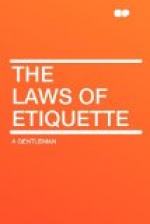It is very difficult for a literary man to preserve the perfect manners and exact semblance of a gentleman. He must be able to throw aside all the qualities which authorship tends to stamp so deeply upon him, and thoroughly to despise the cant of the profession. Yet this must be done without any affectation. Upon the whole, unless he has rare tact, he will please as much by going into company with all the marks of his employment upon his manners, than by awkwardly attempting to throw off his load. One would rather see a man with his fingers inked, than to see him nervously striving to cover them with a tattered kid glove. As to literary ladies, they make up their minds to sacrifice all present and personal admiration for future and abiding renown.
It is not considered fashionable to carry a watch. What has a fashionable man to do with time? Besides he never goes into those obscure parts of the town where there are no public clocks, and his servant will tell him when it is time to dress for dinner. A gentleman carries his watch in his pantaloons with a plain black ribbon attached. It is only worthy of a shop-boy to put it in his waistcoat pocket.
Custom allows to men the privilege of taking snuff, however unneat this habit may appear. If you affect the “tangible smell,” always take it from a box, and not from your waistcoat pocket or a paper. The common opinion, that Napoleon took snuff from his pocket, (which fact, by the way, is denied by Bourrienne,) has for ever driven this convenient custom from the practice of gentlemen, for the same reason that Lord Byron’s anti-neckcloth fashion has compelled every man of sense to bind a cravat religiously about his throat. As to taking snuff from a paper, it is vile.
Women should abstain most scrupulously from tobacco, for nothing can be more fatal to their divinity: they should at least avoid it until past fifty;—that is to say, if a woman past fifty can anywhere be found. Chewing is permitted only to galley-slaves and metaphysicians.
It was a favourite maxim of Rivarol, “Do you wish to succeed? Cite proper names.” Rivarol is dead in exile, having left behind him little property and less reputation. Judging from all experience, if we were to frame an extreme maxim, it should be, “If you wish to succeed never cite a proper name.” It will make you agreeable and hated. Your conversation will be listened to with interest, and your company shunned with horror. You will obtain the reputation of a gossip and a scandal-bearer, and you will soon be obliged either to purchase a razor or apply for a passport. If you are holding a tete-a-tete with a notorious Mrs. Candour, then, indeed, your tongue should be as sharp and nimble as the forked lightning. You must beat her at her own weapons, and convince her that it would be dangerous to traduce your character to others.
A bachelor is a person who enjoys everything and pays for nothing; a married man is one that pays for everything and enjoys nothing. The one drives a sulky through life, and is not expected to take care of any one but himself: the other keeps a carriage, which is always too full to afford him a comfortable seat. Be cautious then how you exchange your sulky for a carriage.




